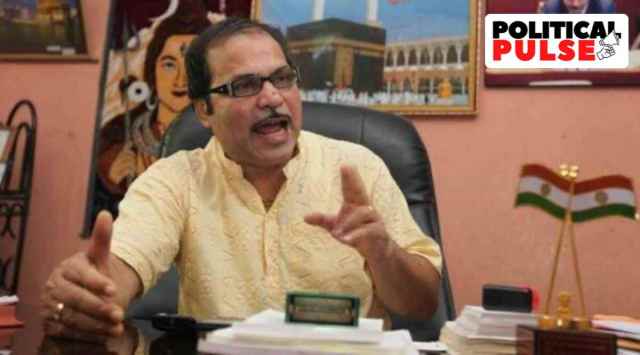Latest Comment
Post Comment
Read Comments
 Congress leader Adhir Ranjan Chowdhury wrote to Lok Sabha Speaker Om Birla on Tuesday. (Express File Photo)
Congress leader Adhir Ranjan Chowdhury wrote to Lok Sabha Speaker Om Birla on Tuesday. (Express File Photo) Locked in a bitter tussle with the BJP over Rahul Gandhi’s disqualification as MP after he was sentenced to two-year imprisonment in a defamation case, Congress leader in Lok Sabha Adhir Ranjan Chowdhury on Tuesday wrote to Speaker Om Birla and raised the question of “equality of law”. He pointed out that a BJP member did not face disqualification in 2016 when he was convicted in a criminal case and sentenced to a three-year jail term.
Chowdhury wrote there was an “uncanny similarity” between Rahul’s case and Amreli MP Naranbhai Bhikhabhai Kachhadiya in 2016.
During the last Lok Sabha, the then MP from Amreli seat in Gujarat, Naranbhai Kachhadiya, was “convicted of an offence under sections 332, 186 and 143 IPC and awarded a punishment of three years imprisonment under section 332 IPC and six months imprisonment under section 143 IPC”, Chowdhury wrote. Kachhadiya, he said, filed an appeal in High Court but it declined to stay the conviction.
“However, the High Court allowed suspension of the sentence,” he stated. “As per the provisions of section 8 of the Representation of the People (RP) Act 1951, Kachhadiya should have been disqualified from membership of the House. However, the then Speaker did not resort to any action (including disqualification) against the Member.”
He noted that it is “intriguing” to note that Rahul Gandhi was summarily disqualified from Lok Sabha in the wake of the Surat district court’s verdict, even though his sentence was suspended by the same court for one month, which facilitated his next attempt for an appeal in higher courts. “You are certainly to be aware that even the sessions court in Surat on Monday granted him bail in the defamation case and suspended his two-year sentence till disposal of the appeal against his conviction,” he wrote.
Chowdhury argued that under Section 8 of the Representation of the People Act, two conditions are to be met before disqualifying an elected member: the member has to be convicted for an offence and, second, he or she has to be sentenced to imprisonment for not less than two years.
“According to my knowledge, before disqualifying the elected member these two conditions are considered prerequisites to be complied with,” Chowdhury stated. “In my view, the second condition cannot stand the test of the prescribed provision of the Representation of the People Act, as the sentence of Gandhi was suspended by the trial court itself.”
He wrote, “With heavy heart and mortification, I plead to you that there should be a debate in Parliament to ascertain the fact that whether Gandhi has been awarded disproportionate punishment which smacks of cognitive dissonance or equality of law is meted out to all the elected members whosoever.”




